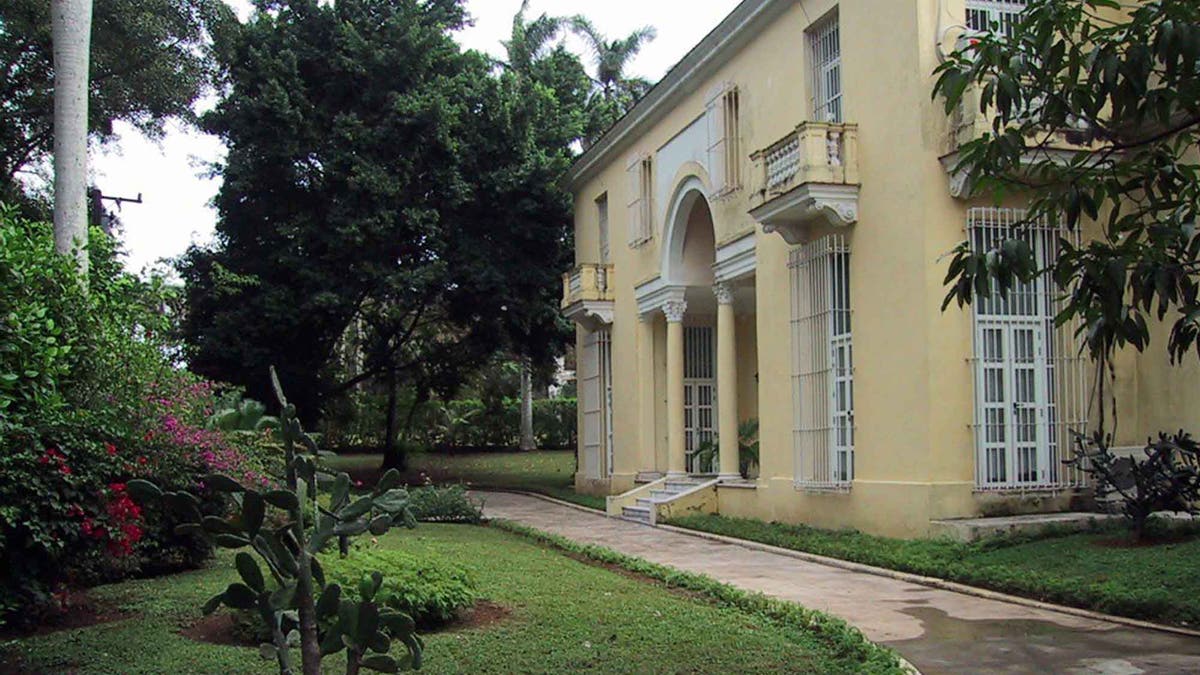
Residence owned by American Roy Schechter, confiscated after the Cuban Revolution in 1959. (ap)
OMAHA, Neb. (AP) – The smell of Cuban coffee drifts from the kitchen as Carolyn Chester digs through faded photos that fill boxes spread across the dining table.
Friends linked arm-in-arm on a Cuban beach.
Men in suits and women in evening gowns at a Havana nightclub.
And in almost every frame, an American man with a salt-and-pepper mustache and a raven-haired woman — Chester's parents — smiling at good fortune that, they could not know, would soon be snatched away.
"I always heard about Cuba ... and all this money that we lost and 'Maybe one day,' but I didn't understand it," Chester says.
- Online travel sites jump on the U.S.-Cuba bandwagon, report rise in demand
- New York Gov. Andrew Cuomo announces April 20 trip to Cuba
- Opinion: A billion dollars, Mr. Biden? For what, exactly?
- In Senate hearing on Venezuela, Sen. Rubio calls for tougher U.S. sanctions
- Critics of Fidel Castro now dis him for something new: his ‘tacky’ interior decorating style
- ‘Hispanicize’ founder recalls how popular gathering began as a modest experiment
- CPAC: GOP presidential hopefuls strive to emerge a favorite at annual conservative gathering
- Ted Cruz campaign lashes out at claims that the senator wants distance from Latinos
Six decades later, that day may finally be nearing for Chester and others like her. To reach it, though, diplomacy will have to settle very old scores.
After Fidel Castro seized power in 1959, Cuba confiscated property belonging to thousands of American citizens and companies. Edmund and Enna Chester lost an 80-acre farm, thousands of dollars' worth of stock, and a Buick that, who knows, may still be plying Havana's streets.
In 1996, Congress passed a law insisting Cuba pay for confiscated property, valued today at $7 billion, before lifting the U.S. embargo.
That went unmentioned in President Barack Obama's December announcement that the countries would resume diplomatic ties. Given Cuba's frail economy, experts say companies whose property was taken might settle for rights to do business there and move on.
But corporations don't cling to memories like families can. That's clear inside Chester's 832-square-foot bungalow, where her mother's gold-framed portrait watches over the yellowing property deed and worthless stock certificates — reminders that Cuba before Castro is history.
But bitterness over what came after lingers on.
___
Inside a little-known federal agency, 5,900 claims files tally property that once belonged to Americans in Cuba.
But really, the claims are stories of lives left behind.
Edmund Chester's story began when he returned to Louisville, Kentucky, from the Army and found work as a newspaper reporter. He taught himself Spanish and in 1929 was hired by The Associated Press, which dispatched him to Havana.
Chester spent a decade reporting from the Caribbean and Latin America, time that seeded two crucial relationships.
The first came after covering a 1933 revolt that put a former sergeant, Fulgencio Batista, in charge of Cuba's military. In the 1950s, when Batista was Cuba's dictator, he trusted Chester — by then a confidante and no longer a journalist — to write his biography.
The second began when Chester covered a 1939 earthquake in Chile and spotted Enna at a hotel swimming pool.
In 1940, CBS hired Chester as chief of radio broadcasting for Latin America. Eventually, he became the network's director of news in New York.
Chester returned to Cuba in 1952, buying a chain of radio stations on an island that was a U.S. economic outpost and a hedonistic getaway for Americans, including celebrities like Frank Sinatra.
Chester eventually sold the stations, but the family continued splitting time between Havana and Florida. He opened a public relations agency in Cuba and bought an 80-acre farm there. In 1957, the Chesters acquired $250,000 worth of Cuban Telephone Co shares.
But Edmund Chester, then Batista's speechwriter, grew uneasy as Castro gained ground.
"I agree that we ought to make (a) complete break with Cuba at the earliest possible moment," he wrote Enna in 1958.
He rejoined the family in Florida before Christmas. Batista fled days later, and Castro seized control.
When the Soviet Union began shipping oil to Cuba, the U.S. ordered island refineries, most American-owned, not to process its archrival's crude.
Cuba seized the refineries. The U.S. eliminated price protection for Cuban sugar, which earned 90 percent of the island's hard currency. By the time President John F. Kennedy imposed the embargo in 1962, Cuba had confiscated scores of properties.
Marooned, Edmund Chester wrote that his nest egg had been "whipped into a batch of Cuban scrambled eggs by the tyranny of Fidel Castro."
__
The federal Foreign Claims Settlement Commission fielded thousands of claims for confiscated Cuban property. The largest came from corporations, led by U.S.-owned Cuban Electric Company, for power plants valued at $268 million. But most came from individuals and families.
Experts differ on what to make of the American claims, protected by international law.
"You're now dealing in the realm of memory more than anything else," says Robert Muse, an attorney representing companies with claims.
But Mauricio Tamargo, commission chairman until 2010 and now a Washington attorney representing claimants, said confiscations inflicted lasting damage on families.
"Many of them never recovered financially," Tamargo says.
